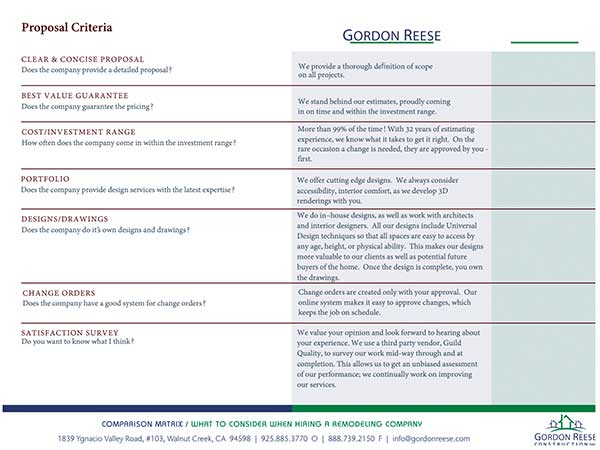Comparing and choosing a remodel contractor may be the most important decision you need to make for your home improvement project. But with so many different professionals with different skills, quotes, and capabilities to choose from, how can you make the right choice? This can be especially confusing for the first-time home remodeler who wants to choose the highest quality contractor. Here we look at the best tips for comparing and choosing a remodel contractor.
Contents
1. Investigate Quality Contractors
The first step in choosing a quality contractor involves doing your research to collect the details of several contractors. This helps you establish a group of professionals that you can compare and choose from. One of the biggest mistakes home remodelers can make – and regret – is choosing an unlicensed contractor or someone they know, but whose credentials they haven’t checked. While online reviews, local authorities or building departments, and word of mouth can be great ways to find contractors, it’s always important to check the contractors’ licenses and insurance before you proceed.

2. Compare The Right Credentials
Should you choose the contractor with the best online reviews or the contractor with the most awards? Do you need an experienced and well-established company or could you use a newer younger company that outsources to subcontractors? Choosing the right contractor means looking out for the right credentials. We created a Comparison Matrix to help you compare and contrast contractors according to a number of different criteria including company background, proposal details, and work-related criteria. This helps highlight the contractors with the skills and credentials that will be most useful to your project so you make the right choice.
3. Keep Track Of Contractors
As you talk to different contractors, compare their credentials, and take bids it’s essential to keep track of who you’ve spoken to and what they’ve said. Staying organized is essential when planning your remodel. Record the names, information, quotes, and contact details of contractors you speak to in a notebook or app. This will help you quickly review or get in touch with your contractors of interest.
4. Don’t Just Go For The Lowest Bid
While contractors often try to appeal to homeowners by making the lowest bids, this doesn’t necessarily guarantee the best quality – or an all-inclusive price. It’s more important to look at value, or what the contractor provides for the bid. The bid also needs to account for experience, track record, insurance, change orders, quality, scheduling, and clean up rather than just the list item.
5. Communication Matters
The people you work with should have excellent communication skills. Are they asking questions to get to know what is important to me? Do they have a good system that makes sense from design through construction? Think about how you feel while you’re talking or emailing with them to make sure that all of your questions are being answered, that you’re made to feel important, and whether you seem to have their attention during your meeting. The way that you’re treated during the sales process is highly indicative of how you’ll be treated as a customer so don’t brush off your concerns here if any come up.
6. Ask to Speak with Previous Clients
Any contractor you’ll want to work with will have references at the ready for you; you just need to ask for them. But it won’t help you to speak with their subcontractors or vendors. Instead, you need to hear from people who’ve already gone through the process you’re about to undertake – their previous clients! Take your time making the calls as this is your best chance to get all of your questions answered, such as:
- How their project went
- What issues, if any, came up
- How the contractor dealt with those issues
- What they wish would have gone differently
- If they’ll work with the contractor again in the future


Recent Comments